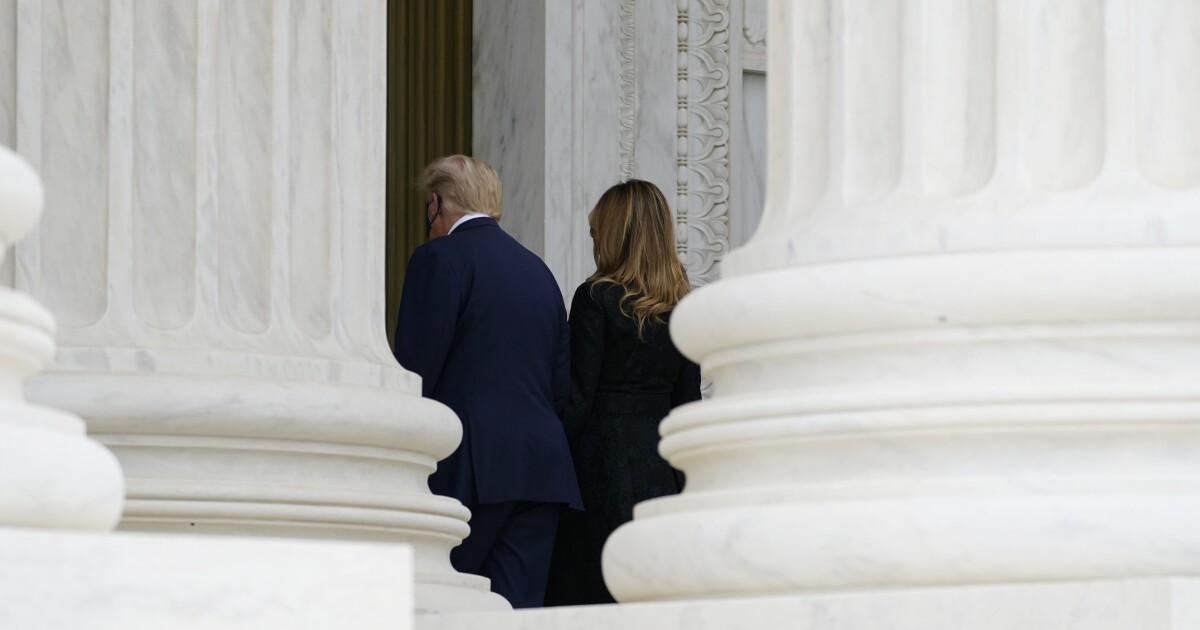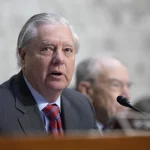

The Supreme Court is almost certain to review a Colorado high court decision that would remove Donald Trump from the state’s primary election ballot now that Michigan‘s high court has come to the opposite conclusion, legal experts say.
The former president is facing two conflicting state Supreme Court rulings on whether he is eligible to appear on state ballots. The decisions stem from lawsuits backed by left-wing groups who claim his calls for a rally on Jan. 6, 2021, that turned into a riot at the United States Capitol should bar him from holding future office under Section 3 of the 14th Amendment.
MICHIGAN SUPREME COURT REJECTS ATTEMPT TO BAN TRUMP FROM 2024 BALLOT
In an unsigned five-page decision, the Michigan high court justices ruled Wednesday that they were “not persuaded that the questions presented should be reviewed by this Court,” marking a significant difference from the state Supreme Court’s ruling in a similar case in Colorado, which went to trial before it was appealed to that state’s top court.
Although the U.S. Supreme Court was already facing pressure to consider the Dec. 19 decision in Colorado barring Trump from the primary ballot, the likelihood of its intervention might be even higher now that the Michigan high court has weighed in on the same question, Harvard Law School emeritus professor Alan Dershowitz told the Washington Examiner.
“A conflict between states over an important current constitutional issue almost assures Supreme Court review,” Dershowitz said.
Trump has yet to file a formal petition for review of the Colorado case to the nine justices in Washington, D.C., three of whom he appointed during his single term — though he is largely expected to make that appeal in the days ahead. The Colorado Supreme Court’s 4-3 decision paused their ruling until Jan. 4. Colorado officials say the issue must be settled by Jan. 5, the deadline for the state to print its presidential primary ballots.
Some legal experts pointed out that the Michigan decision may not have any bearing on whether the nation’s top court intervenes once Trump appeals, in part because the two states have different laws and because Michigan’s top court did not even get to the merits of the 14th amendment challenge.
“I do not think that today’s order by the Michigan Supreme Court … will play a large role in any determination by the U.S. Supreme Court whether to grant certiorari to review the ruling of Colorado Supreme Court issued last week,” Brian Ginsberg, Supreme Court and appellate litigator at Harris Beach PLLC in New York, told the Washington Examiner.
“Because the Michigan Supreme Court order rests on state law, I doubt it will play a large role in the certiorari calculus regarding the Colorado decision. However, the Colorado decision is itself so monumental that the Justices may well decide to accept the case for review on that basis,” Ginsberg added.
The suit was first brought in September by the advocacy group Free Speech For People on behalf of Michigan voters to determine Trump’s eligibility to appear on the ballot. The group argued Trump violated Section 3 of the 14th Amendment, which bans those who “engaged in insurrection” against the United States from holding any civil, military, or elected office without the approval of two-thirds of the House and Senate.
In a solo dissent in Michigan on Wednesday, Justice Elizabeth Welch wrote it was “important” for the state court to issue a decision on the merits of the ballot eligibility question given the gravity of the underlying legal issues.
But the Michigan high court, dominated by Democratic appointees, allowed a lower court ruling to stand. A judge in the lower court had said that election officials may not challenge the eligibility of presidential primary candidates in the state.
In the 33 states that have seen lawsuits challenging Trump’s eligibility, courts have either dismissed the lawsuits or the cases are still pending — meaning Colorado is the only state to disqualify Trump.
George Washington University law professor Jonathan Turley told the Washington Examiner that Colorado “is now an outlier among state supreme courts, but there are a number of other challenges still pending.”
“It’s hard to imagine the Supreme Court refusing to rule on the issue, and this is a historic institutional moment for the Court,” Turley said.
Legal experts, including Turley, have said this moment is also a significant one for Chief Justice John Roberts, who has been forced to navigate a difficult time of sagging trust in the high court; public approval of the Supreme Court has floated at just above 40%, according to the latest Marquette Law School surveys.
And while public approval of the high court remained above 50% during the 2000s, Turley recalled a brief period after the 2000 Bush v. Gore case during which the Supreme Court became more divided due to it being forced to wade into thorny political territories.
CLICK HERE TO READ MORE FROM THE WASHINGTON EXAMINER
“Many of us were surprised when Justice Ruth Bader Ginsburg removed the word ‘respectfully’ from her last line” in the narrow 5-4 election dispute of 2000, Turley said, noting she opted from saying “respectfully dissent” to simply putting “dissent.”
“That produced a crisis for the court that lasted for years. I think that Roberts would like to avoid that and find a way for all the justices to agree that disqualification is not an option for these states, so we’ll see,” Turley added.




